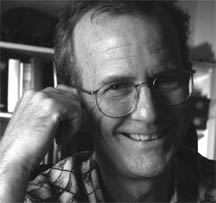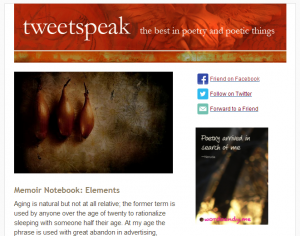Last week, we featured a review of Bone Fires: New and Selected Poems by Mark Jarman here at Tweetspeak Poetry. Published in 2011, it’s a wonderful volume covering poetry collections from the 1970s through the 2000s. And what it covers thematically is an initial focus on autobiography and childhood in his early poetry to the poetry of faith and doubt in his later poems.
Jarman’s poetry is such that one gets interested in the poet — his background, his personality, where he comes from, and how all of this eventually finds its way into his poems. Jarman did that for me, and as I read about his life I began to understand why his poetry appeals to me as strongly as it does.
The son of a minister, Jarman was born in Mount Sterling, Kentucky, in 1952. Even today, it’s a small town, with a population of under 7, 000. It’s some 35 miles east of Lexington, just off Interstate 64. He received a BA degree from the University of California at Santa Cruz in 1974, and an MFA degree from the University of Iowa in 1976. (If you’re wondering how a boy from Mount Sterling, Kentucky, landed up at college in California, remember that his father was a minister, and a considerable part of Jarman’s childhood was spent in California and Scotland.)
His first collection of poetry, a chapbook entitled Tonight is the Night of the Prom, was published in 1974. His first collection of poems, North Sea, was published in 1978. They have since been followed by seven additional collections of poetry, one book-length poem called Iris), and four collections of essays.

The Reaper only lasted a few years, but Jarman and McDowell collected the publication’s articles and published them as (surprise) The Reaper Essays in 1996.
Currently, Jarman is Centennial Professor of English at Vanderbilt University. He’s received numerous awards and recognitions, including a Joseph Henry Jackson Award, fellowships from the National Endowment for the Arts and the John Simon Guggenheim Foundation, the Robert Frost Fellowship from the Bread Loaf Writers’ Conference, and the 1991 Poet’s Award Prize (for The Black Riviera).
I find Jarman’s poems both accessible and recognizable (we’re almost contemporaries, so that might be a contributing factor). His poems of childhood, drawing upon his own experiences and memories, are specific to his own generation but transcend generational considerations. And he was heavily influenced by a beloved grandmother (something else we share in common).
His later poetry centers on the themes of doubt, faith, and how the two often coexist — that it is, in fact, normal for doubt and faith to coexist. He unites the two in his poems in a vivid and real way. Here’s an example, “Unholy Sonnet 13, ” from Questions for Ecclesiastes:
Drunk on the Umbrian hills at dusk and drunk
On one pink cloud that stood beside the moon,
Drunk on the moon, a marble smile, and drunk,
Two young Americans, on one another,
Far from home and wanting this forever—
Who needed God? We had our bodies, bread,
And glasses of a raw, green, local wine,
And watched our Godless perfect darkness breed
Enormous softly burning ancient stars.
Who needed God? And why do I ask now?
Because I’m older and I think God stirs
In details that keep bringing back that time,
Details that are just as vivid now—
Our bodies, bread, a sharp Umbrian wine.
Jarman’s poetry is best read in a quiet place, without distractions, to appreciate both what he says and how it says it.
Photograph by seanmcgrath. Sourced via Flickr. Post by Glynn Young, author of the novels Dancing Priest and the recently published A Light Shining.
Related:
Dressing My Daughters, at Poetry Foundation
The Supremes, at Poetry.org
______________________
Subscribe to our free weekly newsletter.
We’ll make your Saturdays happy with a regular delivery of the best in poetry and poetic things.
Need a little convincing? Enjoy a free sample.
- Longfellow’s “Paul Revere’s Ride”: Creating a National Legend - April 17, 2025
- Poets and Poems: Katie Kalisz and “Flu Season” - April 15, 2025
- Poets and Poems: Michelle Ortega and “When You Ask Me, Why Paris?” - April 10, 2025

davis says
©1990
i just received
“the black riviera”
signed 2/4/94
to alisia
with warm wishes
mark jarman
the poems
with underlined lines
a few
some in pencil
some in pen
black and blue
i am glad to have been introduced to the words that he has written.